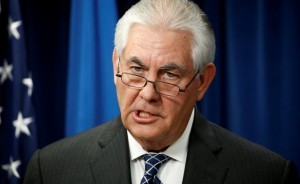Thirty-six members of the US House of Representatives encouraged US Secretary of State Rex Tillerson to continue the active engagement by the State Department in the Eastern Mediterranean, including against Turkish threats concerning the Cypriot Exclusive Economic Zone (EEZ).
In a letter, the Representatives urged Tillerson to maintain a strong stance against rhetoric and provocations that threaten the spirit of cooperation and progress that has emerged in the region in recent years.
On July 13 energy giant Total is scheduled to begin exploratory drilling off Cyprus.
“We are writing to encourage continued active engagement by the State Department in the Eastern Mediterranean, and in particular to urge a strong stance against rhetoric and provocations that threaten the spirit of cooperation and progress that has emerged in the region in recent years,” the letter said.
“The burgeoning ties between Cyprus, Greece and Israel should be of particular importance to the United States. Beyond sharing democratic values, the three countries are increasingly collaborating in energy, counterterrorism, and tourism — fields that can contribute to European energy independence, promote economic stability in southern Europe and the Middle East, and help counter regional extremism and terrorism,” they added.
Israel’s partnerships with Greece and Cyprus, it said, ensure the security of Israel’s Mediterranean border. “Israel’s strategic depth has always been a challenge, even more so now while the region is experiencing deteriorating security. Greece and Cyprus allow the Israeli Air Force to conduct exercises over their territory. The three countries exchange intelligence and have conducted search and rescue missions together. Greece and Cyprus are only the second and third countries, after the US, with which Israel has signed a ‘status of forces agreement.’”.
Futhermore, they note that cooperation in the Eastern Mediterranean has the power to create partnerships where there was once conflict.
“Energy collaboration has facilitated and furthered important regional conversations. Consistent high-level contacts and trilateral summits involve other regional stakeholders including the EU, Italy, Egypt and Lebanon, providing opportunities for diplomatic engagement between these nations — engagement that otherwise might not occur,” it said.
“Further, these new energy sources promise to allow key US allies and partners to decrease their energy dependence on suppliers like Russia and Iran”.
It is vital, they said, “that the State Department continue active engagement in the region — not just for the benefit of the US and Israel — but because the cooperation facilitated by natural gas finds is not without challenges. Turkey, which stands to benefit greatly from energy exploration, repeatedly violates Greece’s air and sea territory and has issued numerous threats against the continued exploration in and exploitation of the Exclusive Economic Zone (EEZ) of the Republic of Cyprus. Cyprus’ EEZ is safeguarded under international law and has been consistently supported by the United States government. There is also a long-standing dispute over which nation controls a maritime area off the coast of the Israel-Lebanon border”.
“With so much progress and potential at stake, we urge you to publicly reaffirm the commitment of the United States to support energy exploration and exploitation in the Eastern Mediterranean in a manner consistent with long-standing US policy. Further, we look forward to the ongoing engagement of the State Department in facilitating and supporting diplomatic, military and economic cooperation among allies in the region,” they concluded.
This letter is the latest product of the partnership between the Hellenic American Leadership Council (HALC) and the American Jewish Committee (AJC). HALC and AJC worked with the Congressional Hellenic Israel Alliance (CHIA) caucus and its two chairmen – Gus Bilirakis and Ted Deutch – launched the letter in time for the back to back conferences of the AJC and PSEKA.
Ask me anything
Explore related questions





